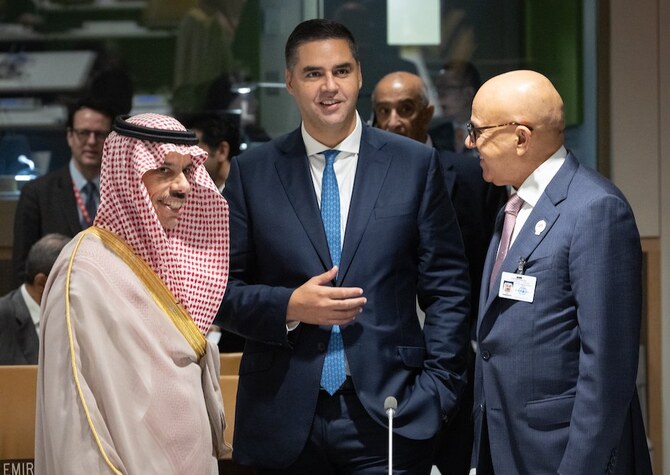WASHINGTON: Slovenia’s foreign minister on Thursday called for an end to Israel’s wars against Hamas in Gaza and Hezbollah in Lebanon, and for peace in the wider Middle East.
Tanja Fajon also urged more countries to follow in the footsteps of her nation by recognizing Palestine as a sovereign and independent state, and called on the Israeli government to withdraw from the Palestinian territories it occupies, follow the rules of international law and respect the UN Charter.
Her appeal to the international community followed an informal, high-level meeting, chaired by Slovenia in its role as president of the UN Security Council this month, between council members and the secretary-general and other representatives of the Arab League.
Of the 193 members of the UN, 146 now formally recognize Palestinian statehood. Slovenia became one of them in June, following a vote in which 52 members of its parliament voted in favor and none against. Norway, Spain and Ireland similarly recognized Palestinian statehood in May.
“I urge other countries to follow our example and recognize the Palestinian state as a sovereign state, an independent state, and give a hope to the Palestinian population,” said Fajon.
Regarding Israel’s ongoing war on Gaza, the first anniversary of which is approaching, and the recent escalation of hostilities against Hezbollah in Lebanon, Fajon said she was very concerned about the possibility that hostilities might spread across the region.
She said Slovenia has called for restraint and peace since the beginning of the conflict and added: “It’s our collective responsibility to respect the resolutions of the Security Council and to do everything in our power to have a political solution because there is no military solution that can bring peace to the region.”
More than 41,000 Palestinians have been killed in Gaza since the war began on Oct. 7 last year, many of them women and children, and thousands have been injured.
Ahmed Aboul Gheit, the secretary-general of the Arab League, said that overall, the meeting, which took place on the sidelines of the UN General Assembly in New York, had been “constructive.”
The participants included representatives from Saudi Arabia, Bahrain and Iraq, the current members of the Arab Summit Troika, a rotating group of three nations that monitors the implementation of resolutions and commitments adopted by the Arab League.
He said the Arab representatives listened to the views expressed during the meeting and highlighted the need for an end to hostilities in Lebanon and support for the current proposal by the US and France for a 21-day ceasefire between Hezbollah and Israel.
They also discussed with members of Security Council the current situations in Gaza and Lebanon and reiterated that the Saudi-proposed Arab Peace Initiative endorsed by an Arab League summit in Beirut in 2002 remains on the table for Israel.
It calls for Israeli authorities to withdraw from all occupied Arab territories in Palestine and the Golan Heights in Syria, in exchange for full recognition of the State of Israel and full diplomatic ties with all Arab nations.
Aboul Gheit said the meeting provided “an opportunity to show the members of the Security Council and the rest of the UN that the Arab world and Arab countries are still insisting on offering Israel the Arab Peace Initiative that (includes) recognition (of Israel in exchange for) withdrawal” from occupied Arab territories.





























